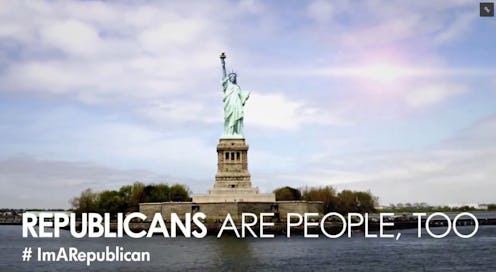News
Hey, Republicans Are People, Too!

When you think of the oppressed and over-scrutinized people in our society, what springs to mind first? Victims of racial injustice, perhaps, or families enduring crippling poverty? Well, there's another oft-disparaged group that's now demanding its time in the spotlight, to air some grievances — that's right, "Republicans are people too." In a new web campaign, a product of Texas-based Glass House Strategies, ad man Vinny Minchillo is attempting to whip up sympathy for all the Republicans who've drawn flack on their internet, simply for their political views.
It's been up for a couple days now, and according to the Washington Post, creator Vinny Minchillo had a personal motivation behind it: "... It seems like it's OK to say anything to a Republican. People say things about Republicans that they would say about a terrorist or thug."
While you might expect me to start off with something snarky about it, I actually can't fault the message — not entirely, at least. As anybody who's ever perused the Facebook posts of a politicized friend or family member knows, conversation can sometimes run a little hot online, owing both to policy disagreements and preconceived notions. I don't happen to think anti-Republican bias is anywhere near the top of the idea list for this type of criticism — the slew of sexist abuse prominent and outspoken women face on social media, for example, seems more pressing, and less overtly political.
And obviously, being lumped in with terrorists isn't an exclusively Republican dilemma — I couldn't begin to recall all the times conservatives have accused liberals of being soft, or even tacitly supporting terrorism. But that said, I will happily concede that Republicans are people too. I've even known a few! While my personal experience is just that, however, none of them had beards.
The obvious distinction, however, between dehumanizing language (or just flat-out trolling or harassment) directed at Republicans as compared to, say, people of color, is that a political party isn't something you're born into — however much the Bushes and Kennedys might make it seem that way. It's a choice, ostensibly backed by a belief in a certain set of ideals, or at least support for the party's real-world policy prescriptions.
On the other hand, a woman who's being tweet-screamed at by a misogynst can't really say anything to diffuse the situation, because the criticism is of something innate. Basically it's a difference in kind, not degree — judgments and attacks based on who you are, rather than what you profess.
But that's not to say that I should hold anybody's Republicanism against their subscription to The New York Times, obviously, whatever they may think about the content therein — even liberals don't always like the Times! This was pretty clear during their recent dustup over their racially controversial review of Shonda Rhimes' upcoming TV series. So, that on its own might not ease up the criticism.
Unfortunately, some of the video's examples do get a little straw-man-ish. Who ever said Republicans didn't use Macs? I've always understood the base stereotypes about Republicans to be that they're a bunch of low-tech apologists for big-business, which would cater well to Apple — they of the pricey, bendy iPhones with charmingly simple operating systems.
It's worth noting that Minchillo, the man behind this campaign, is no newcomer to the realm of political messaging — he handled ads for Mitt Romney's 2012 presidential campaign, as well as ads for Rep. Randy Neugebauer, according to Glass House Strategies' website. In fact, he was distinctly proud of his team's work, contributing a write-up about it in Ad Age: "What I Did On My Summer Vacation: Created Ads For the Romney-Paul Ticket" (it was actually the Romney-Ryan ticket, but hey).
Before I was a political ad guy, I was a brand ad guy. I believe in the power of brand, especially in politics. That's why I was amazed when the Obama campaign took a big, positive, thoughtful brand (Hope and Change) and tossed it overboard in favor of talking almost exclusively about fear and negativity. Given the record they had to work with, they had little choice. The result wasn't pretty, but it worked.
Images: Glass House Strategies/The Washington Post (4)